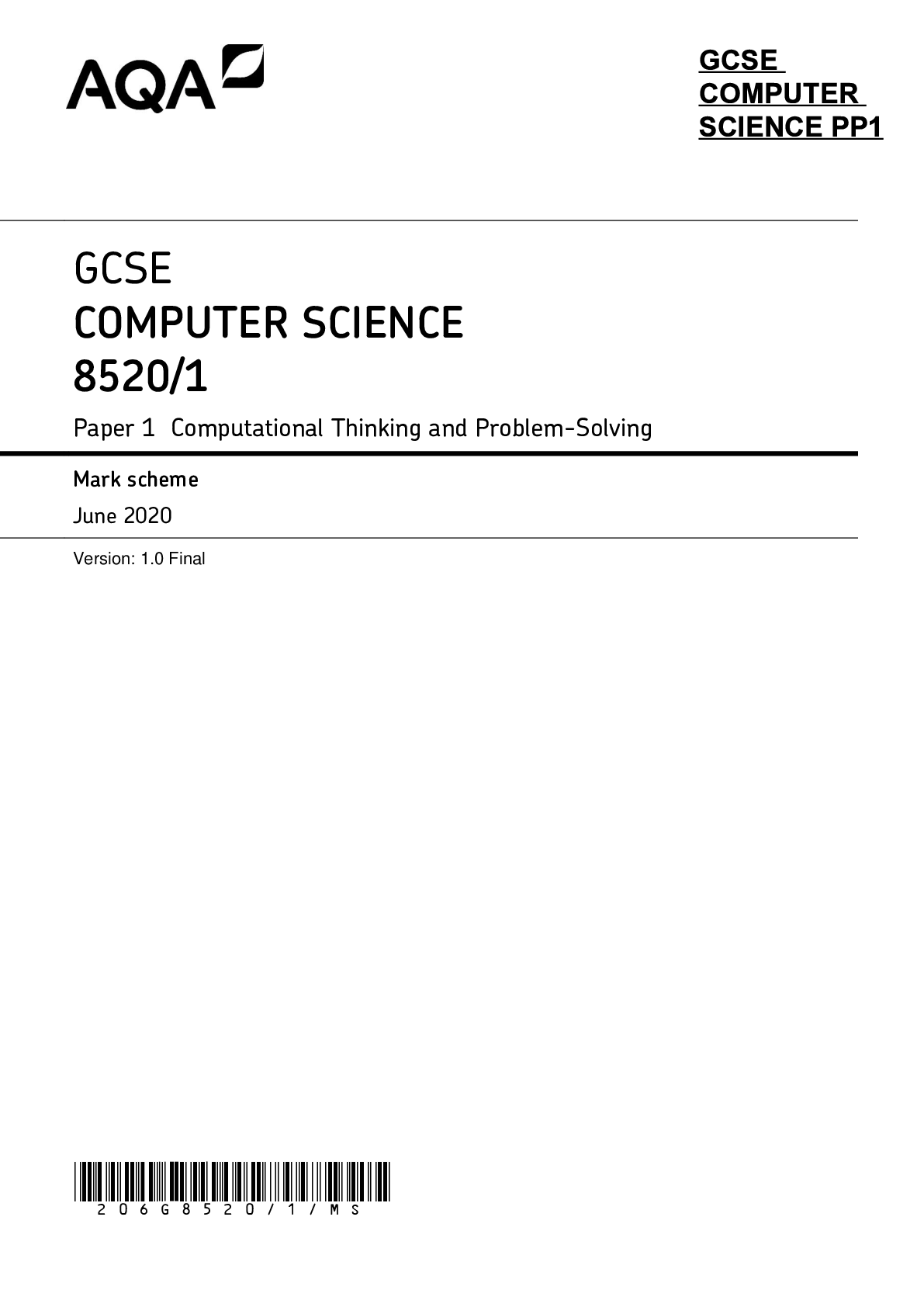Psychology > AQA QUESTION and MARK SCHEMES > A-level PSYCHOLOGY 7182/2 Paper 2 Psychology in context Mark scheme June 2021 Version: 1.0 Final Mar (All)
A-level PSYCHOLOGY 7182/2 Paper 2 Psychology in context Mark scheme June 2021 Version: 1.0 Final Mark Scheme
Document Content and Description Below
A-level PSYCHOLOGY 7182/2 Paper 2 Psychology in context Mark scheme June 2021 Version: 1.0 Final Mark Scheme *216A7182/2/MS* MARK SCHEME – A-LEVEL PSYCHOLOGY – 7182/2 – JUNE 2021 2 Mar... k schemes are prepared by the Lead Assessment Writer and considered, together with the relevant questions, by a panel of subject teachers. This mark scheme includes any amendments made at the standardisation events which all associates participate in and is the scheme which was used by them in this examination. The standardisation process ensures that the mark scheme covers the students’ responses to questions and that every associate understands and applies it in the same correct way. As preparation for standardisation each associate analyses a number of students’ scripts. Alternative answers not already covered by the mark scheme are discussed and legislated for. If, after the standardisation process, associates encounter unusual answers which have not been raised they are required to refer these to the Lead Examiner. It must be stressed that a mark scheme is a working document, in many cases further developed and expanded on the basis of students’ reactions to a particular paper. Assumptions about future mark schemes on the basis of one year’s document should be avoided; whilst the guiding principles of assessment remain constant, details will change, depending on the content of a particular examination paper. Further copies of this mark scheme are available from aqa.org.uk Copyright information AQA retains the copyright on all its publications. However, registered schools/colleges for AQA are permitted to copy material from this booklet for their own internal use, with the following important exception: AQA cannot give permission to schools/colleges to photocopy any material that is acknowledged to a third party even for internal use within the centre. Copyright © 2021 AQA and its licensors. All rights reserved. MARK SCHEME – A-LEVEL PSYCHOLOGY – 7182/2 – JUNE 2021 3 Level of response marking instructions Level of response mark schemes are broken down into levels, each of which has a descriptor. The descriptor for the level shows the average performance for the level. There are marks in each level. Before you apply the mark scheme to a student’s answer read through the answer and annotate it (as instructed) to show the qualities that are being looked for. You can then apply the mark scheme. Step 1 Determine a level Start at the lowest level of the mark scheme and use it as a ladder to see whether the answer meets the descriptor for that level. The descriptor for the level indicates the different qualities that might be seen in the student’s answer for that level. If it meets the lowest level then go to the next one and decide if it meets this level, and so on, until you have a match between the level descriptor and the answer. With practice and familiarity, you will find that for better answers you will be able to quickly skip through the lower levels of the mark scheme. When assigning a level you should look at the overall quality of the answer and not look to pick holes in small and specific parts of the answer where the student has not performed quite as well as the rest. If the answer covers different aspects of different levels of the mark scheme you should use a best fit approach for defining the level and then use the variability of the response to help decide the mark within the level, ie if the response is predominantly level 3 with a small amount of level 4 material it would be placed in level 3 but be awarded a mark near the top of the level because of the level 4 content. Step 2 Determine a mark Once you have assigned a level you need to decide on the mark. The descriptors on how to allocate marks can help with this. The exemplar materials used during standardisation will help. Answers in the standardising materials will correspond with the different levels of the mark scheme. These answers will have been awarded a mark by the Lead Examiner. You can compare the student’s answer with the standardised examples to determine if it is the same standard, better or worse than the example. You can then use this to allocate a mark for the answer based on the Lead Examiner’s mark on the example. You may well need to read back through the answer as you apply the mark scheme to clarify points and assure yourself that the level and the mark are appropriate. Indicative content in the mark scheme is provided as a guide for examiners. It is not intended to be exhaustive and you must credit other valid points. Students do not have to cover all of the points mentioned in the indicative content to reach the highest level of the mark scheme. An answer which contains nothing of relevance to the question must be awarded no marks. MARK SCHEME – A-LEVEL PSYCHOLOGY – 7182/2 – JUNE 2021 4 Section A Approaches in psychology 0 1 Outline the way in which Pavlov studied classical conditioning. [4 marks] Marks for this question: AO1 = 4 Level Mark Description 2 3–4 Knowledge of Pavlov’s studies of classical conditioning is clear and generally well detailed. The answer is generally coherent with appropriate use of terminology. 1 1–2 Knowledge of Pavlov’s studies of classical conditioning is limited. The answer as a whole lacks clarity and has inaccuracies. Terminology is either absent or inappropriately used. 0 No relevant content. Possible content: • detail of Pavlov’s classical conditioning experiments into salivation reflex in dogs • knowledge of Pavlovian concepts in the context of Pavlov’s experiments: unconditioned stimulus; conditioned stimulus; unconditioned response; conditioned response • detail of Pavlovian theory – learning by association; temporal association/contiguity. Credit other relevant material. Note: information presented in a diagram can be credited. [Show More]
Last updated: 2 years ago
Preview 1 out of 19 pages

Buy this document to get the full access instantly
Instant Download Access after purchase
Buy NowInstant download
We Accept:

Reviews( 0 )
$11.00
Can't find what you want? Try our AI powered Search
Document information
Connected school, study & course
About the document
Uploaded On
Jun 30, 2022
Number of pages
19
Written in
Additional information
This document has been written for:
Uploaded
Jun 30, 2022
Downloads
0
Views
122


.png)

















